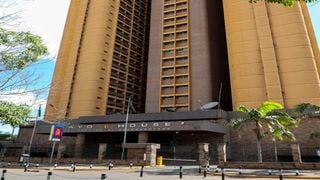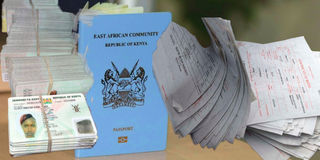
Nyayo House, Nairobi. Interior CS Kithure Kindiki has been compelled by pressure from all corners of society to commit to cracking down on Nyayo House graft cartels.
| Dennis Onsongo | Nation Media GroupNews
Premium
Service quality dips as corruption takes root in government
Kenyans are an angry lot; and they have good reason to be, judging by the frustrations they experience in accessing public services guaranteed to them under the Constitution.
The process of applying for and obtaining essential documents such as passports, identity cards, certificates of good conduct, marriage certificates and birth certificates is proving to be a mess for citizens. What is becoming clear is that applying for and receiving services are two very different things in actual practice.
Last month, what started as a frustrated Kenyan's angry rant on social media about how difficult it is to get basic services from government offices quickly went viral, with hundreds of citizens joining the fray to confirm that nothing seems to be working.
"Every day a business closes because of the cost of doing business; it now takes months to get an ID or passport. People are sharing beds in hospitals and schools are overcrowded and underfunded. When do our lives matter?" Natasha Kimani lamented in a social media post.
The queues of patient but frustrated Kenyans grow longer every day. Often, the interaction at the point of service is not encouraging. The instructions given to weary customers never change. They include "come back tomorrow", "the passport printer has broken down" or the or the ever-present excuse that "the system is down".
These are all lame excuses that add fuel to the raging fire in the hearts of Kenyans already battered by the ailing economy that has seen the price of basic commodities skyrocket.
For example, Wanja Kamau*, a well-known human rights defender, applied for her son's passport earlier this year. This document was to be used by her son's international school to register for his International General Certificate of Secondary Education (IGCSE) exams. The passport never arrived on time and the boy had to forgo the exams and wait patiently for the next one. The passport has still not arrived.
This is despite assurances by the Principal Secretary for Immigration and Citizenship, Prof Julius Bitok, who told the Parliamentary Committee on Diaspora Affairs and Migrant Workers on July 6 that the government had ordered two passport printing machines from Germany.

The process of applying for and obtaining essential documents such as passports, identity cards, and birth certificates is proving to be a mess for citizens.
This, he said, was part of the government's efforts to reduce the time it takes to obtain a passport to a record seven days by September. The PS added that the broken printing machines would be up and running in two days following the successful acquisition of two lasers that had been damaged, thus speedily dealing with the backlog of 50,000 passports that were yet to be printed.
"With these new printers, the country will be able to comfortably print a minimum of 6,000 passports per day against a daily demand of 4,500 passports, thus quickly clearing the backlog and at the same time printing the newly applied for passports without delay," the PS explained.
This is yet to happen.
John Njoroge* is a 19-year-old student who sat for his Kenya Certificate of Secondary Education (KCSE) exams last year and immediately applied for an ID.
He did very well in the exams and rushed to apply for government bursaries and loans under the new university funding model. He was shocked to find that he could only get the government bursary, but not the loan, which would essentially cover hundreds of thousands of shillings in fees over four years of study.
The best he can do is to apply for the loan, hope that the ID arrives on time and that the loan, which is meant to pay a large part of his school fees, is transferred to the university to which he has been admitted.
Higher Education Loans Board boss Charles Ringera clarified last week that, in order to get the loan, students must have IDs, as the law states that no loan transaction can be made with a minor.
"Students without IDs will get the government scholarship, for loans they can still apply and the funds will be accessed when they get their IDs at 18," he said.
Words cannot describe the desperation facing Luke Gachangi*.
He is due to go to the US soon to study, and only one document stands in the way of his visa application. That document is the Certificate of Good Conduct, known on the e-Citizen portal as the Police Clearance Certificate.
He submitted his application in May, but the document, which used to be ready in less than two weeks, is still pending. The date for his departure is fast approaching, but will he even make it to the departure area of the airport if his visa application process is stalled because of a mistake that is not his own to begin with?
As for John Okello, he wonders why anyone would apply for a certificate of good conduct when "these days, the certificate expires while it still shows that it is queued in the portal and never comes out".
"How much do you have if I help you now? You will get your certificate tomorrow," an officer at the station he had applied to told him in a text message that he showed to Nation.
The same thing happened to John's friend, Mike Wanjala, who also received instructions on how to get the document immediately.
"Go online, apply for a good certificate and select DCI [Directorate of Criminal Investigations] headquarters, Karura as the fingerprint centre. Once there, choose whether you want to wait for the duration or pay Sh5,000 to get it immediately," read the text message he received.
There is currently a crisis at the registry office, where Kenyans who want to get married are finding it very difficult to obtain marriage certificates. The situation is so bad that couples are even proceeding with church weddings without certificates from the Attorney-General's office.
This is in contravention of the State's statutes, which stipulate that the marriage certificate, issued by the government in triplicate, is required before any marriage can take place.
One copy goes to the couple, another to the church, mosque or temple, and the final copy is taken to the Attorney-General's office for record keeping.
"We have been given temporary permission to hold our wedding while we wait for the certificate to be issued by the registrar," a couple who wedded without the document told Nation in July.
They had to leave the church’s copy with the presiding priest because the State had not given them a serial number.
After giving birth, new parents begin the process of applying for birth certificates, which prove their newborns' citizenship, until they receive national ID cards when they turn 18.
Joel Mokaya, a new father from Kiambu, tried to apply for his son's birth certificate in July, but the system "went haywire", he said.
"I could only access the online service when I selected Nairobi, but now my child was born in Kiambu and I could not proceed because the details of his place of birth are in Kiambu. The only option the portal offered me was Nairobi, not any other county," he said. So, he stopped the application process.
"Only God can help me and my child in this registration process," he said wearily.
His case is not so different from that of Caroline Awidhi, who has been trying unsuccessfully for a year and a half to obtain her son's birth certificate. She was rightly advised by government officials at the Huduma Centre to apply for the certificate online, which she did after parting with the required Sh570.
"After that, I waited for a year to receive a letter telling me where to pick it up, but nothing was sent. I went back to the Huduma Centre to inquire further but they told me to be patient because some people had to wait as long as two years," she said.
When the child was a year and a half old, she went to the Registrar-General's office in Upper Hill, Nairobi. She thought she would go home with the certificate.
"I was shocked when I started a new process with payment,” she said. The notification she was expecting never came, again.
“I only decided to check again after almost eight months, when my son was two years and two months old," she said.
The pain does not end there; it also hits foreigners who want to visit the country, as was the case with Judicaelle Irakoze. She was supposed to be in Kenya from July 15 for a training conference. Her visa was issued on July 17, two days after she was supposed to arrive in Kenya to attend the conference.
"I applied online for visas for Cameroon, Guinea and Kenya on the same day. Cameroon took three days, Guinea one hour. Kenya took three weeks and was approved two days after the day I was supposed to travel. I was so impressed with Guinea," she wrote on her Twitter timeline, sharing the document she received from the Department of Immigration and Citizenship.
She did not attend the seminar.
Citizens seem resigned to their fate of endless disappointment by the very government that is supposed to guarantee some of these crucial documents. No one could sum up the current situation better than a social media user identified as Wordslinger.
"I applied for a smart driving licence in January, but so far nothing. People have been waiting for passports for over a year. Business licences, which used to take minutes, now take over two months. Things are slowly grinding to a halt. Basic services have disappeared. Lazima uchoke na utoe kitu (You have to get tired and bribe). Exhausting," he said.





